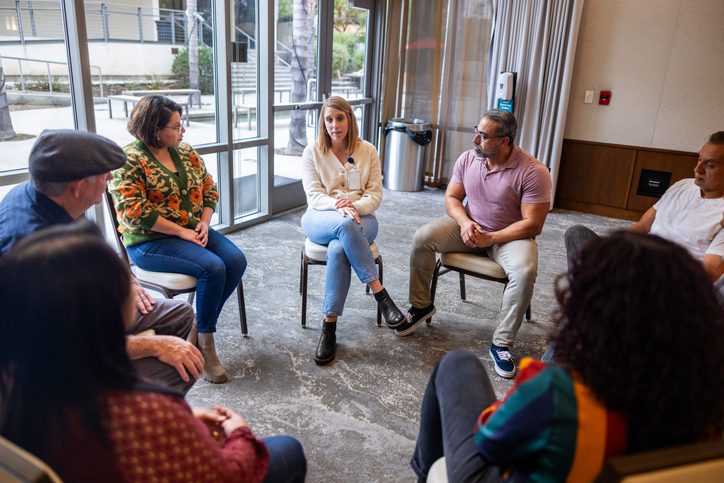How to Cultivate Better Resilience
Some life skills we learn as we go. For example, we might gradually adjust from a fixed mindset to a growth mindset as we move through recovery. So how can we develop better resilience—that level of mental “toughness” that helps us bounce back from difficult situations, accept what happened, and then move forward? Here are some factors to consider.
What it Means to Be Resilient
A core quality of resilience is to recognize that setbacks and failures are part of life and use these experiences to build stronger coping mechanisms. One aspect that helps with this is to develop stronger emotional regulation.
The Cornell Research Program on Self-Injury and Recovery defines emotional regulation as “a term generally used to describe a person’s ability to effectively manage and respond to an emotional experience.” For some people, behaviors such as aggression, avoidance, the misuse of alcohol and substances, and self-injury indicate a lack of emotional regulation ability. But as you grow and change, it’s easier to embrace healthier methods that help create stability, such as exercising, getting good sleep, talking with trusted family and friends, and therapy.
Most people with resilience also have a positive perception of themselves. The Cleveland Clinic notes that “with a positive self-image, we recognize and own our assets and potentials while being realistic about our liabilities and limitations. With a negative self-image, we focus on our faults and weaknesses, distorting failure and imperfections.”
Another factor is how you approach problem-solving. According to Johns Hopkins Medicine, “being reactive means waiting until some situation occurs and then responding to it. Being proactive means anticipating, planning, and confronting problems before they reach crisis points (when you must act rapidly). Being proactive puts you in control of the situation.”
What Compromises Our Ability to be Resilient?
According to the nonprofit mental health organization Mind, there are numerous challenges to building or maintaining resilience, which we provide verbatim below. “Research shows that it’s easier to develop resilience if we don’t face these barriers. But many of these things are difficult or impossible to change,” the organization states. Do any of these reflect your circumstances?
- Experiencing discrimination and hate, including racism, homophobia, biphobia, or transphobia
- Having a long-term physical health condition
- Having a mental health problem
- Living far away from family or friends, or having difficult relationships with them
- Experiencing poverty and money worries, including debt or problems with benefits
- Living in an area with poor access to services like healthcare, public transport, and green spaces
- Having poor-quality housing
- Lacking safety and protection, such as living in areas with poor policing
But don’t lose hope. The American Psychological Association (APA) states that “resilience is ordinary, not extraordinary. Psychological research demonstrates that the resources and skills associated with resilience can be cultivated and practiced.”
How to Build Better Resilience
The APA recommends focusing on “four core components—connection, wellness, healthy thinking, and meaning.” Here’s how.
- Connection. Choose to surround yourself with “trustworthy and compassionate individuals who validate your feelings, which will support the skill of resilience,” the organization suggests. This might be a recovery peer support group, a faith-based organization, a hobby club, or special friends and family members.
- Wellness. As mentioned above, relying on healthy behaviors improves resilience: not only sleeping, exercising, and eating whole foods, but also avoiding compromising influences and discovering new ways to cope with stress more effectively.
- Healthy thinking. “If you feel overwhelmed by a challenge, remind yourself that what happened to you isn’t an indicator of how your future will go, and that you’re not helpless,” the APA states. “You may not be able to change a highly stressful event, but you can change how you interpret and respond to it.” This might include practices such as reducing negative self-talk, gratitude journaling, using positive affirmations, and more.
- Meaning. Finding more purpose in your sober life—such as giving back, finding the right resources for your skills, and other action-oriented pursuits—adds to your feelings of self-perception and worth.
Find more ideas for improving your resilience in these motivational books.
Benefit From Fair Oaks’ Whole-Person Healing
At Fair Oaks Recovery Center in Sacramento, California, we’ve earned the status of a licensed Chemical Dependency Recovery Hospital, issued by the California Department of Public Health to addiction rehabilitation and dual diagnosis treatment facilities that provide high-level acuity care. We understand that you’re much more than a diagnosis and a series of symptoms. Our board-certified professionals develop individualized treatment plans that help you realize your full potential. If you or a loved one are ready for this type of whole-person approach, call our admissions team today.
BrightEdge\BEIXFClient Object
(
[connectTime:BrightEdge\BEIXFClient:private] => 49
[_get_capsule_api_url:BrightEdge\BEIXFClient:private] => https://ixfd1-api.bc0a.com/api/ixf/1.0.0/get_capsule/f00000000296879/772514832?client=php_sdk&client_version=1.5.12&base_url=https%3A%2F%2Ffairoaksrecoverycenter.com%2Fblog%2Fhow-to-cultivate-better-resilience%2F&orig_url=https%3A%2F%2Ffairoaksrecoverycenter.com%2Fblog%2Fhow-to-cultivate-better-resilience%2F&user_agent=Mozilla%2F5.0+AppleWebKit%2F537.36+%28KHTML%2C+like+Gecko%3B+compatible%3B+ClaudeBot%2F1.0%3B+%2Bclaudebot%40anthropic.com%29
[displayCapsuleUrl:BrightEdge\BEIXFClient:private] => https://ixfd1-api.bc0a.com/api/ixf/1.0.0/get_capsule/f00000000296879/772514832
[capsule:BrightEdge\BEIXFClient:private] => BrightEdge\Capsule Object
(
[accountId:protected] => f00000000296879
[publishingEngine:protected] => ixf-compiler
[dateCreated:protected] => 1.73632801687E+12
[datePublished:protected] => 1.73632801687E+12
[version:protected] => 1.0.0.0
[capsuleNodeList:protected] => Array
(
[0] => BrightEdge\Node Object
(
[type:protected] => bodystr
[dateCreated:protected] => 1.7363280185E+12
[datePublished:protected] => 1.73632801687E+12
[publishingEngine:protected] => link-block
[engineVersion:protected] => 1.0.0.0
[metaString:protected] =>
[content:protected] =>
[feature_group:protected] => body_1
[redirectType:BrightEdge\Node:private] =>
[redirectURL:BrightEdge\Node:private] =>
)
[1] => BrightEdge\Node Object
(
[type:protected] => headstr
[dateCreated:protected] => 1.73632801857E+12
[datePublished:protected] => 1.73632801687E+12
[publishingEngine:protected] => app-js
[engineVersion:protected] => 1.0.0.0
[metaString:protected] =>
[content:protected] =>
[feature_group:protected] => _head_open
[redirectType:BrightEdge\Node:private] =>
[redirectURL:BrightEdge\Node:private] =>
)
)
[configList:protected] => stdClass Object
(
[page_groups] => Array
(
[0] => stdClass Object
(
[priority] => 1
[include_rules] => Array
(
[0] => .*fairoaksrecoverycenter\.staging\.tempurl\.host\/.*
)
[name] => staging
[exclude_rules] => Array
(
)
)
[1] => stdClass Object
(
[priority] => 2
[include_rules] => Array
(
[0] => fairoaksrecoverycenter\.com
)
[name] => Global Settings
[exclude_rules] => Array
(
)
)
)
)
[pageGroupNodes:protected] => Array
(
[0] => BrightEdge\Node Object
(
[type:protected] => bodystr
[dateCreated:protected] => 1.7363280185E+12
[datePublished:protected] => 1.73632801687E+12
[publishingEngine:protected] => link-block
[engineVersion:protected] => 1.0.0.0
[metaString:protected] =>
[content:protected] =>
[feature_group:protected] => body_1
[redirectType:BrightEdge\Node:private] =>
[redirectURL:BrightEdge\Node:private] =>
)
)
[allPageGroupNodes:protected] => stdClass Object
(
[excluded_config] => Array
(
[0] => stdClass Object
(
[feature_group] => body_1
[engine_version] => 1.0.0.0
[content] =>
[date_published] => 1736328016866
[date_created] => 1736328018500
[type] => bodystr
[publishing_engine] => link-block
)
)
[staging] => Array
(
[0] => stdClass Object
(
[feature_group] => body_1
[engine_version] => 1.0.0.0
[content] =>
[date_published] => 1736328016866
[date_created] => 1736328018500
[type] => bodystr
[publishing_engine] => link-block
)
)
[Global Settings] => Array
(
[0] => stdClass Object
(
[feature_group] => body_1
[engine_version] => 1.0.0.0
[content] =>
[date_published] => 1736328016866
[date_created] => 1736328018503
[type] => bodystr
[publishing_engine] => link-block
)
)
)
[pageGroup:protected] => Global Settings
)
[_capsule_response:BrightEdge\BEIXFClient:private] => {
"account_id": "f00000000296879",
"date_published": 1736328016866,
"key": "-0",
"is_universal_capsule_enabled": "false",
"capsule_version": "1.0.0.0",
"engine_version": "1.0.0.0",
"version": 2,
"date_created": 1736328016866,
"nodes": [
{
"feature_group": "body_1",
"engine_version": "1.0.0.0",
"content": "",
"date_published": 1736328016866,
"date_created": 1736328018503,
"type": "bodystr",
"publishing_engine": "link-block"
},
{
"feature_group": "_head_open",
"engine_version": "1.0.0.0",
"content": "\n\n\n",
"date_published": 1736328016866,
"date_created": 1736328018572,
"type": "headstr",
"publishing_engine": "app-js"
}
],
"config": {
"page_groups": [
{
"priority": 1,
"include_rules": [
".*fairoaksrecoverycenter\\.staging\\.tempurl\\.host\\/.*"
],
"name": "staging",
"exclude_rules": []
},
{
"priority": 2,
"include_rules": [
"fairoaksrecoverycenter\\.com"
],
"name": "Global Settings",
"exclude_rules": []
}
]
},
"publishing_engine": "ixf-compiler",
"page_group_nodes": {
"excluded_config": [
{
"feature_group": "body_1",
"engine_version": "1.0.0.0",
"content": "",
"date_published": 1736328016866,
"date_created": 1736328018500,
"type": "bodystr",
"publishing_engine": "link-block"
}
],
"staging": [
{
"feature_group": "body_1",
"engine_version": "1.0.0.0",
"content": "",
"date_published": 1736328016866,
"date_created": 1736328018500,
"type": "bodystr",
"publishing_engine": "link-block"
}
],
"Global Settings": [
{
"feature_group": "body_1",
"engine_version": "1.0.0.0",
"content": "",
"date_published": 1736328016866,
"date_created": 1736328018503,
"type": "bodystr",
"publishing_engine": "link-block"
}
]
}
}
[allowDirectApi:BrightEdge\BEIXFClient:private] => 1
[debugMode:BrightEdge\BEIXFClient:private] =>
[disableRedirect:BrightEdge\BEIXFClient:private] =>
[deferRedirect:BrightEdge\BEIXFClient:private] =>
[_normalized_url:BrightEdge\BEIXFClient:private] => https://fairoaksrecoverycenter.com/blog/how-to-cultivate-better-resilience/
[_original_url:BrightEdge\BEIXFClient:private] => https://fairoaksrecoverycenter.com/blog/how-to-cultivate-better-resilience/
[client_user_agent:BrightEdge\BEIXFClient:private] => Mozilla/5.0 AppleWebKit/537.36 (KHTML, like Gecko; compatible; ClaudeBot/1.0; +claudebot@anthropic.com)
[errorMessages:protected] => Array
(
)
[profileHistory:protected] => Array
(
[0] => Array
(
[0] => constructor
[1] => 49
)
[1] => Array
(
[0] => getFeatureString
[1] => 0
)
[2] => Array
(
[0] => getFeatureString
[1] => 0
)
)
[config] => Array
(
[sdk.environment] => production
[api.endpoint] => https://ixfd1-api.bc0a.com
[sdk.charset] => UTF-8
[sdk.account] => f00000000296879
[sdk.connectTimeout] => 1000
[sdk.socketTimeout] => 1000
[sdk.crawlerConnectTimeout] => 1000
[sdk.crawlerSocketTimeout] => 1000
[whitelist.parameter.list] => ixf
[forcedirectapi.parameter.list] => ixf-api|ixf
[flat.file] => true
[sdk.proxyPort] => 0
[sdk.proxyProtocol] => http
[crawler.useragents] => google|bingbot|msnbot|slurp|duckduckbot|baiduspider|yandexbot|sogou|exabot|facebot|ia_archiver|brightedge
[content.base.path] => /nas/content/live/fairoaksrecove/wp-content/themes/valley
[diagnostic.type] => full_encrypted
[diagnostic.string] => 1
[capsule.mode] => remote.prod.capsule
[page.independent] => false
)
)



